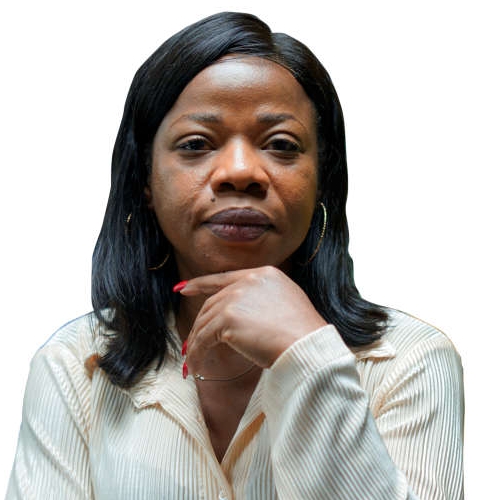
A 13-year-old boy who sells onions at the Rumuokoro market in Port Harcourt has narrated how he was forced into child labor by his aunty who compels him to sell at the market to support the family financially.
He says he is not in school because he has to be in the market. He told Nigeria Info that his parents' separation led to him relocating from the South East to live with his aunt in Port Harcourt.
“My father and my mother get problem, my father say make my mother and en children go village, we travel go village and my father call us say she no won marry mother again. We come house, he pursue us, everything wey dey house na my mother get am, he no gree may we carry everything, na only some of our clothes she carry,” he said in Pidgin.
The teenage boy longs to continue his education, disappointed that his aunty has reneged on her promise to enroll him in a school.
“I stop for primary three. She tell my mother say she go put me for school. What of somebody use English follow me talk, how i won take reply am? I no like as I no dey go school. I go like go back to school.”
Another teenager, an 11-year-old girl who declined to have her voice on record, said she sells snacks to support her family. I caught up with her during school hours hawking fishrolls along the Rumuosi area of Port Harcourt. She explained that her parents had not enrolled her in a school because of financial constraints.
The teenagers’ stories highlight the national burden of child labor in Nigeria. A 2022 report by the National Bureau of Statistics says over 24 million children are involved in child labor, with 14.3 million of them engaged in hazardous work. A legal practitioner, Hilda Desmond Ihekaire, says the Nigerian constitution is against child labor:
“Child labor is an offense punishable under the Child Rights Act 2003 with five years imprisonment. It can also be with the option of fine or imprisonment or both, depending on the severity of the offense. The Act further provides that no child shall be involved in any industrial undertaking or labor. If a child is 15 years the child can be employed for the purpose of learning a trade but any child below 14 years should not be employed for any reason at all.”
The Rivers State Coordinator of the African Women Lawyers Association (AWLA), Gloria Anuri-Ohia also spoke about the position of the Rivers State Child’s Rights Law 2022, section 91 on child labor:
“The child is someone who is less than 18 as provided by the law. No child is required to lift, carry, or remove anything so heavy, as to be likely to adversely affect the child’s physical, mental, spiritual, moral, or social development, or employed as a domestic help outside the child’s own home or family. No child shall be employed or work in an industrial area except if that child is doing it as per a technical school or similar approved institute, if the work is supervised by the appropriate authority.
Speaking on the need for children to go to school, rather than engage in labor, a social worker and child protection specialist, Glory Kanu-Chinwike, urged the government to strictly enforce laws that ensure every child in Nigeria goes to school.
“It doesn’t matter how impoverished you think you are, asking your child to go do some form of trading, business, putting your child out for sale, sending your child into prostitution, engaging your child in anything that gets money at the end of the day. There are laws that have been put in place to ensure that all children go to school, enjoy fundamental human rights, but the truth is the enforcement of these legislations has been the challenge all these while,” Kanu-Chinwike said.
Similarly, the Chief Intelligence Officer of the National Agency for the Prohibition of Trafficking in Persons (NAPTIP) in Rivers State, Winifred Edeh, warned against engaging children below 18 in labor. She spoke of the penalties that await those who subject children to labor or human trafficking:
“Any person who employs, receives, or hires out a child under the age of 12, as a domestic worker commits an offense and is liable on conviction to imprisonment for a minimum term of six months and not exceeding seven years. Also, any person who employs, receives, or hires a child to do any work that is exploitative to the physical, social, or psychological development of the child, commits an offense and is liable on conviction to imprisonment for a minimum term of two years but not exceeding seven years without an option of fine.”
Mrs. Edeh also encouraged parents to give birth to the number of children they can cater for and urged residents to report any cases of child labor or other forms of violence against children to NAPTIP.
“Even when you are giving your child out, and you know who and who do constant checks, what is going on? Is my child this… people should take action. Even if you are staying in an environment, an estate, or a compound where you know that they are maltreating a child, don’t say, ‘It does not concern me’, you take action for those who cannot come to the agency. Wherever you are, so far you have an Android phone or an Apple phone, just go to Play Store and download the NAPTIP eye-reporter App, it is for a seamless reporting of cases and capture of evidence, once you send it, NAPTIP will take action, you remain anonymous.”
The International Day Against Child Labour is observed yearly on 12 June to raise awareness and push for action to end all forms of child labor. Our World in Data states that about 16 percent of children aged 5-17 are involved in child labor globally, meaning that their formative years are traded for cheaper labor.


